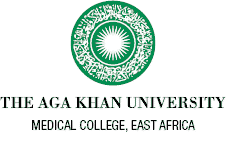How long is the Radiology residency program? The Radiology and Diagnostic Imaging Program at Aga Khan University Hospital, Nairobi is a Master of Medicine 4-year program.
How are the exams structured? In addition to multiple choice, modified essay questions and SIRE exams given to the 1st and 4th year residents, a dissertation is required to graduate the program.
How many residents do you have in each year? The Radiology and Diagnostic Imaging program accepts up to four residents in each year.
What is the Radiology schedule like? The resident schedule is designed to have mainly at the image reporting workstation, procedure rooms as well as didactic learning. The first year focus on Medical imaging physics, Radiological Anatomy and Radiological Techniques. From the second year to final year residents are involved in learning Radiological aspects of pathology in the various body systems using various imaging modalities.
How much leave time do I get? Resident get 23 days of leave a year. However, the residency program enforces no more than 10 days can be taken at a time to ensure continuity of learning and minimize disruption to patient care.
Do I get sick leave? Yes, you are entitled to sick leave and will require to submit a sick-sheet. The Chief resident will find coverage for the resident who is sick.
Where should I live in Nairobi? We recommend that residents find a place close to the hospital to live as this will facilitate easier access to the hospital.
Does the Residency Program have a policy toward discrimination? There is hospital-wide policy against discrimination of any sort. The residency program takes very seriously such issues and will not tolerate any matters related to discrimination or bullying .
What is level of supervision of residents? The residency program strongly encourages direct and indirect supervision of residents at all time. Faculty member are always available physically and validate every imaging or procedure report created by the resident. They are also available on phone after hours for consulation.
Will I get regular feedback on my performance? Mid rotation and after completion of each rotation, you should receive feedback from a faculty member. The Program director will meet with every resident four times a year to go over your evaluations and progress. If a resident requires remediation, the program will notify the resident in advance and will work with the resident on a remediation plan.
What are my evaluations based on? We attempt to evaluate 6 core competencies for each resident. The competencies include Medical Knowledge, Practice-Based Learning and Improvement, Patient care and Procedural skills, System-Based Practices, Interpersonal and Communication Skills and Professionalism.
When do I start calls? The first year residents are slowly eased into calls in view of the minimal exposure to Radiology they have had in the past. This starts with them shadowing the resident on call between 5-8 pm in May and they start their soft calls in August that run between 5-8 pm with a second resident within the hospital to assist if need arises. The full calls start upon completion of the Part 1 exams which are done at the end of the first year.
Is it easy to find a mentor for my dissertation? The Department of Radiology assists and guides residents with their research question as well as methods of data collection, results and discussions. The Chair of Radiology plays an active role guiding residents with their dissertation projects.
What other research opportunities are present? In the first year of training, medical audits make a good introduction to research. As you progress in your training, you will encounter various imaging appearance of various diseases, some of which would make good case reports. We expect our residents to be keen to publish material. Residents are encouraged to seek guidance from faculty members and it is required to include a faculty member in your projects.
Do residents have work rooms? The program greatly values the contribution of residents in taking care of patients. As such, a work rooms on the fifth floor have been assigned to residents to use for teaching and learning purposes.
Is mentorship available? The program encourages mentors to help guide residents through their residency. Mentors also provide use feedback and constructive criticism to help the residents develop and grow academically.
Are meals provided to residents ? Residents on-call are provided meals during their call hours. If a resident chooses, they are more than welcome to bring their own food. There is lounge area in the call rooms equipped with a fridge and microwave to store and reheat meals. Meals are also provided to residents during work hours at the cafeteria as a subsidized cost.
Are residents supported to attend conferences and meetings? The Department of Radiology, based on available monies, makes every attempt to help sponsor residents to attend conferences and meetings. Residents might be required to contribute to their registration fees, travel and accommodation if they are not making a presentation at the conference or meeting.


